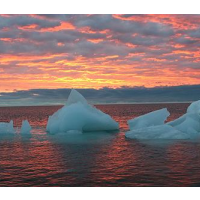“Unstoppable” Polar Ice Melt Portends Rising Oceans and Society in Crisis
 Melting icebergs in the Antarctic (AP photo)
Melting icebergs in the Antarctic (AP photo)
Global warming has already produced a point of no return for a mammoth section of the Antarctica ice sheet, whose melting will help significantly raise sea levels in the coming centuries, according to two teams of scientists.
Research of both groups of experts focused on the West Antarctica ice sheet, which is breaking apart at an unstoppable rate, they said.
“This is really happening,” Thomas Wagner, the head of the National Aeronautics and Space Administration’s (NASA) programs on polar ice who helped oversee some of the research, told The New York Times. “There’s nothing to stop it now. But you are still limited by the physics of how fast the ice can flow.”
Eric Rignot, a glaciologist at the University of California, Irvine, who led one of the research teams, said their “observational evidence” showed “a large sector of the West Antarctic ice sheet has gone into irreversible retreat” and had “passed the point of no return.”
The consequence of the West Antarctica ice sheet melting could mean an increase of 10 feet in sea levels, which would pose a crisis for coastal cities and communities around the world.
The lead author of the other study, Ian Joughin, a glaciologist with the University of Washington’s Applied Physics Laboratory, said, according to The Seattle Times. “You can’t just vaporize all that ice and assume it’s not going to have other consequences. Given all that, it’s hard to imagine the whole western ice sheet not collapsing.”
The scientists also reaffirmed what most experts in the field have said about the cause of global warming and climate change—that the man-made release of greenhouse gases has helped to destabilize the ice sheet. They also said other factors may also be involved in the melting.
The New York Times pointed out that the new findings echoed the warnings of glaciologist John H. Mercer of the Ohio State University, who warned in 1978 that the expanded release of carbon dioxide and other gases by mankind could have a disastrous impact on the West Antarctic ice sheet.
“He was assailed at the time, but in recent years, scientists have been watching with growing concern as events have unfolded in much the way Dr. Mercer predicted. (He died in 1987),” the Times’ Justin Gillis and Kenneth Chang wrote.
-Noel Brinkerhoff
To Learn More:
Scientists Warn of Rising Oceans From Polar Melt (by Justin Gillis and Kenneth Chang, New York Times)
‘Unstoppable’ Decline for Ice Sheet (by Darius Dixon, Politico)
Widespread, Rapid Grounding Line Retreat of Pine Island, Thwaites, Smith and Kohler Glaciers, West Antarctica from 1992 to 2011 (by E. Rignot, J. Mouginot, M. Morlighem, H. Seroussi and B. Scheuchl; Geophysical Research Letters) (abstract)
Russians Capitalists Celebrate Global Warming by Building $20-Billion Natural Gas Plant in Arctic (by Noel Brinkerhoff, AllGov)
NASA Study: Arctic Warming Causing Ocean to Emit Harmful Methane Gas (by Noel Brinkerhoff and David Wallechinsky, AllGov)
U.S. Uses Global Warming to Lay Claim to 200,000 Square Miles of Arctic Waters (by Noel Brinkerhoff, AllGov)
- Top Stories
- Unusual News
- Where is the Money Going?
- Controversies
- U.S. and the World
- Appointments and Resignations
- Latest News
- What If China Invaded the United States?
- Donald Trump Has a Mental Health Problem and It Has a Name
- Trump Goes on Renaming Frenzy
- Trump Deports JD Vance and His Wife
- Trump Offers to Return Alaska to Russia






Comments